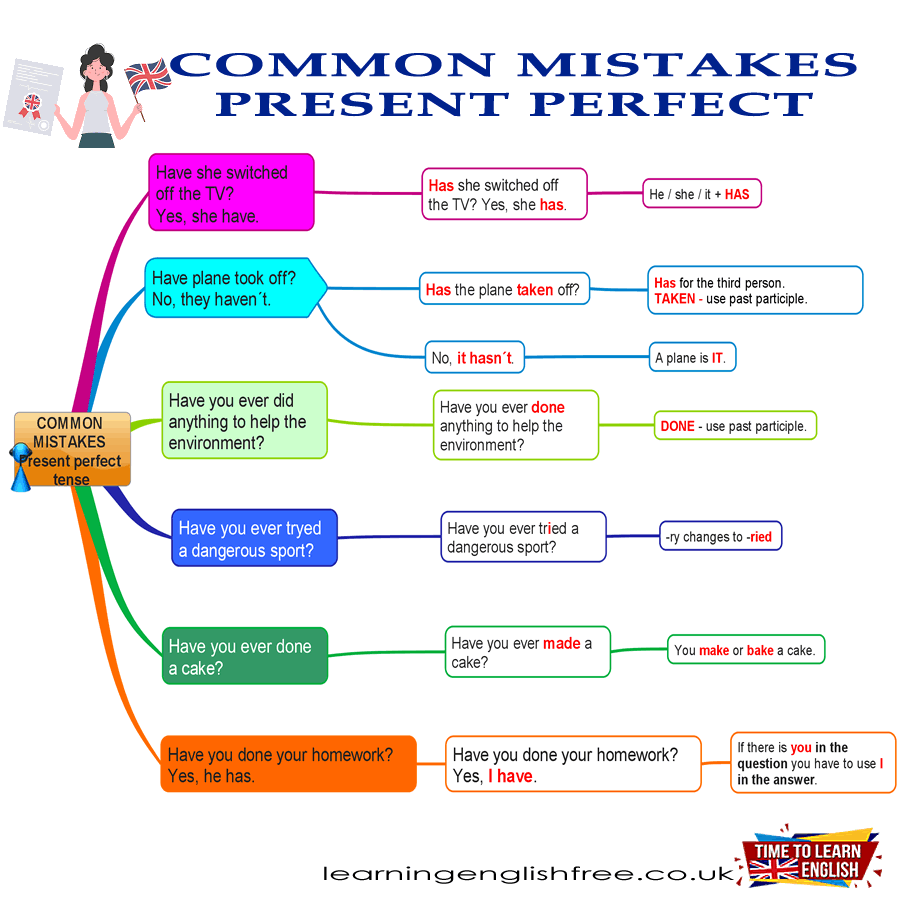
Tackling Present Perfect Pitfalls
Navigating the Nuances of Present Perfect
In this lesson, we will explore common mistakes made while using the Present Perfect tense in English. By understanding these errors, learners will improve their grammar and speak more naturally.
Learning Objectives:
- Identify and correct common mistakes in the Present Perfect tense.
- Understand the correct use of 'has' and 'have' in different contexts.
- Gain confidence in using the Present Perfect tense correctly in everyday conversations.
Useful Vocabulary:
Present Perfect tense, Past Participle, Grammar accuracy.
Part 1: Common Mistakes and Corrections
Mistake: Incorrect Auxiliary Verb
- Incorrect: "Have she switched off the TV? Yes, she have."
- Correct: "Has she switched off the TV? Yes, she has."
- Explanation: Use 'has' for third-person singular (he, she, it) in the Present Perfect tense.
Mistake: Wrong Past Participle Form
- Incorrect: "Have plane took off? No, they haven't."
- Correct: "Has the plane taken off? No, it hasn't."
- Explanation: Always use the past participle form of the verb. 'Taken' is the past participle of 'take'. A plane is referred to as 'it'.
Mistake: Incorrect Past Participle Usage
- Incorrect: "Have you ever did anything to help the environment?"
- Correct: "Have you ever done anything to help the environment?"
- Explanation: Use the past participle 'done' instead of 'did'.
Mistake: Incorrect Verb Form
- Incorrect: "Have you ever tryed a dangerous sport?"
- Correct: "Have you ever tried a dangerous sport?"
- Explanation: '-ry' changes to '-ried' in the past participle form.
Mistake: Incorrect Verb Selection
- Incorrect: "Have you ever done a cake?"
- Correct: "Have you ever made a cake?"
- Explanation: 'Make' or 'bake' is used for preparing a cake, not 'do'.
Consistency in Question and Answer
- Example: "Have you done your homework? Yes, I have."
- Tip: If there is 'you' in the question, use 'I' in the answer.
Mastering Present Perfect
Understanding the Essentials
Grasping the use of 'has' and 'have' and the correct past participle forms is crucial in mastering the Present Perfect tense.
Common Errors as Learning Tools
Identifying and correcting these common mistakes can significantly improve your grammar skills.
Practicing for Proficiency
Regular practice using these corrections in daily conversations will enhance your English fluency.
Real-World Application
Apply these lessons in real-life situations, from professional emails to casual chats, to solidify your learning.
Continuous Learning
For more resources and interactive exercises, join our community on www.facebook.com/learningenglishfree.co.uk.
